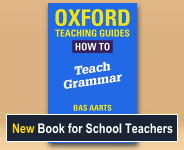Variation and standards
In this lesson we ask students to think about variation in language - including reflections on their own language and the language around them.
Goals
- Define some key terms in linguistics: phonetics, semantics, pragmatics, grammar, and lexis.
- Apply those key terms to examples of linguistic variation.
- Identify some differences between our own use of English and the English around us.
Lesson Plan
The teacher explains that today, we will look at variation in the English language. We experience variation every day: the way we speak with friends in the park is different from the way we speak with a teacher in class, for example. The first exercise in this lesson asks students to identify variation around them. We also experience variation between Standard English (which is required for exams, job interview, etc.), regional norms (which are unique to the part of the world we live in), or age-related norms (such as new slang that is unique to teenagers).
The first step is a ‘Think, Pair, Share’ activity: students should take 5 minutes to write down a few unique aspects of the way they speak English. They can consider the following questions, which also appear on Slide 1 in the Activity page in the right hand menu:
- How is the way you speak English different from the way your parents speak English?
- How is it different from the way your teachers speak English?
- How is it different from the way the Queen speaks English?
- How is it different from the English of the BBC?
- How is it different from the English of Eastenders, Coronation Street, or Rastamouse?
- How is it different from the English of Hollywood movies?
After students have identified at least one feature of their own English, they should turn to a neighbour and share their findings. Finally, each pair can present their findings to the whole class. Make a list of the features that students have identified.
Then, Slide 2 in the Activity page presents some key terms in linguistics, with definitions. Students should look at the features they've identified and match them with a key term. For example, if they've noticed that they pronounce some words differently from the way it's done on the BBC, then that qualifies as phonetics. If they use a word with a different meaning form their parents or grandparents, that's semantics. If they have noticed that they use different language in different contexts, that's pragmatics. Next, grammar inludes the way students order words in sentences, and the forms of words they might use, which might differ from one context to another. Finally, lexis covers the possibility that students know some regional words or some recent slang that may not be Standard English.
Welcome!

Englicious is totally free for everyone to use!
But in exchange, we ask that you register for an account on our site.
If you’ve already registered, you can log in straight away.
Since this is your first visit today, you can see this page by clicking the button below.
- Printer-friendly version
- Log in to view or leave comments

